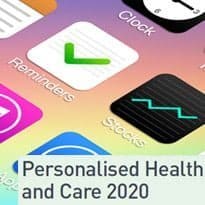The National Information Board’s plans to establish “kitemarking” for healthcare applications have been cautiously welcomed by the app development community, which says more details about the accreditation process are needed.
As part of its long-awaited IT strategy, ‘Personalised Health and Care 2020’, the NIB announced last week that it will set up a group to establish a regulation and accreditation of healthcare apps, as well as digital services and associated mobile devices.
Apps that pass the kitemarking process will be able to use the NHS brand and be accessible through the NHS Choices website.
“This is in order to support innovation, and consumer and professional confidence, including enabling GPs to be able to prescribe them,” the document says.
Ewan Davis, one of the founders of HANDI, a not-for-profit venture that supports healthcare apps, told EHI the NIB plans reflect the importance of apps to digital healthcare, and the need to make sure that patients can easily find “safe and appropriate” apps.
“The current methods haven’t led to safe and appropriate apps being used; they’ve led to ones that are popular,” he argued. “Just typing in ‘diabetes’ and picking whatever comes up on top isn’t a safe approach to take.”
However, Davis said implementing a kitemarking process will be a significant challenge, with a need to determine how significant a strong evidence base is for apps that are new to the market.
“You can get into a bit of a double-bind with the tyranny of evidence, where you say it can’t be used until there’s evidence for it, but you won’t have that until it’s being used.”
Davis said technical issues will also be a complicating factor, with a need to ensure that apps work across various mobile platforms and as operating system upgrades are delivered.
Funding for the kitemarking process will also need to be resolved, with some app developers willing to support its establishment, but unable to pay large sums for accreditation fees.
Davis said liability is another issue for the NHS, as it will need to determine what level of accountability it may need to accept in the event of a problem with an app it has endorsed.
Any kitemarking process will need to tie into formal regulatory processes conducted by organisations such as the Medicines and Healthcare Products Regulatory Agency, he said.
Dan Bladon, co-founder of digital health design consultancy and app developer Design and Prosper, told EHI the kitemarking plans are “really exciting” but need further development.
“It’s definitely the direction the NHS needs to be heading in… and with NHS Choices, they have an opportunity to be that distribution channel for useful, well-designed digital products. My main concern is, what framework are they going to use to evaluate apps and allow kitemarking?”
Bladon said his experience with the existing NHS health apps library, which he had submitted two apps for but not heard back about, means he is sceptical about NHS England’s commitment.
“How can they take that step forward? I’m excited but a little bit cynical.” However, he said the kitemarking process will help to address questions about the efficacy of health apps, provided the evaluation process is properly designed.
“I think there’s a lot of really good to-level strategy at the moment, but as ever, it’s about the detail in terms of the long-term implementation and execution.”
Natalie Bateman, head of health and social care at TechUK, told EHI the organisation can “definitely see value” in the app plans but believes further information is needed.
“It’s quite a significant move, and I can understand why they’re doing it to give greater confidence, but I think it’s important to look at it in more detail.”
Bateman said NHS England needs to prepare “clearly defined business goals” for the kitemarking process to determine the aims of the project, as well as the business risk that may result from the process.
Tom Levey, senior technology evangelist at app optimisation company AppDynamics, told EHI the kitemarking process “will only help the acceptance of apps by end users” by giving them confidence in their reliability.
However, Levey said the NHS must ensure it focuses on quality rather than quantity with the apps it endorses, while the kitemarking process should include a commitment to technical best practice to ensure the apps perform well under pressure.
The NIB strategy says further proposals for the kitemarking process will be published by June next year, with kitemarking of apps set to begin by the end of 2015.
Read more reaction to the National Information Board strategy in this week's Insight, '2020 Vision'.

